Developing HR Skills: Individual, Teams, and Organizations - Report
VerifiedAdded on 2020/06/06
|17
|5022
|105
Report
AI Summary
This report delves into the crucial aspects of human resource management, focusing on the essential knowledge, skills, and behaviors required of HR professionals. It begins by outlining the core competencies necessary for effective HR practices, such as communication, decision-making, negotiation, and change management. The report then presents a personal skills audit for Jane Cambridge, evaluating her existing skills and identifying areas for improvement, including database management, HR software proficiency, and training delivery. A detailed professional development plan is proposed for Jane, outlining a structured approach to enhance her skills through self-assessment, skill development in areas like communication and database usage, and exploration of development opportunities. The report also compares organizational and individual learning, emphasizing the importance of continuous learning for business sustainability. Furthermore, it explores the role of High-Performance Working (HPW) in employee engagement and competitive advantage, and discusses performance management approaches.
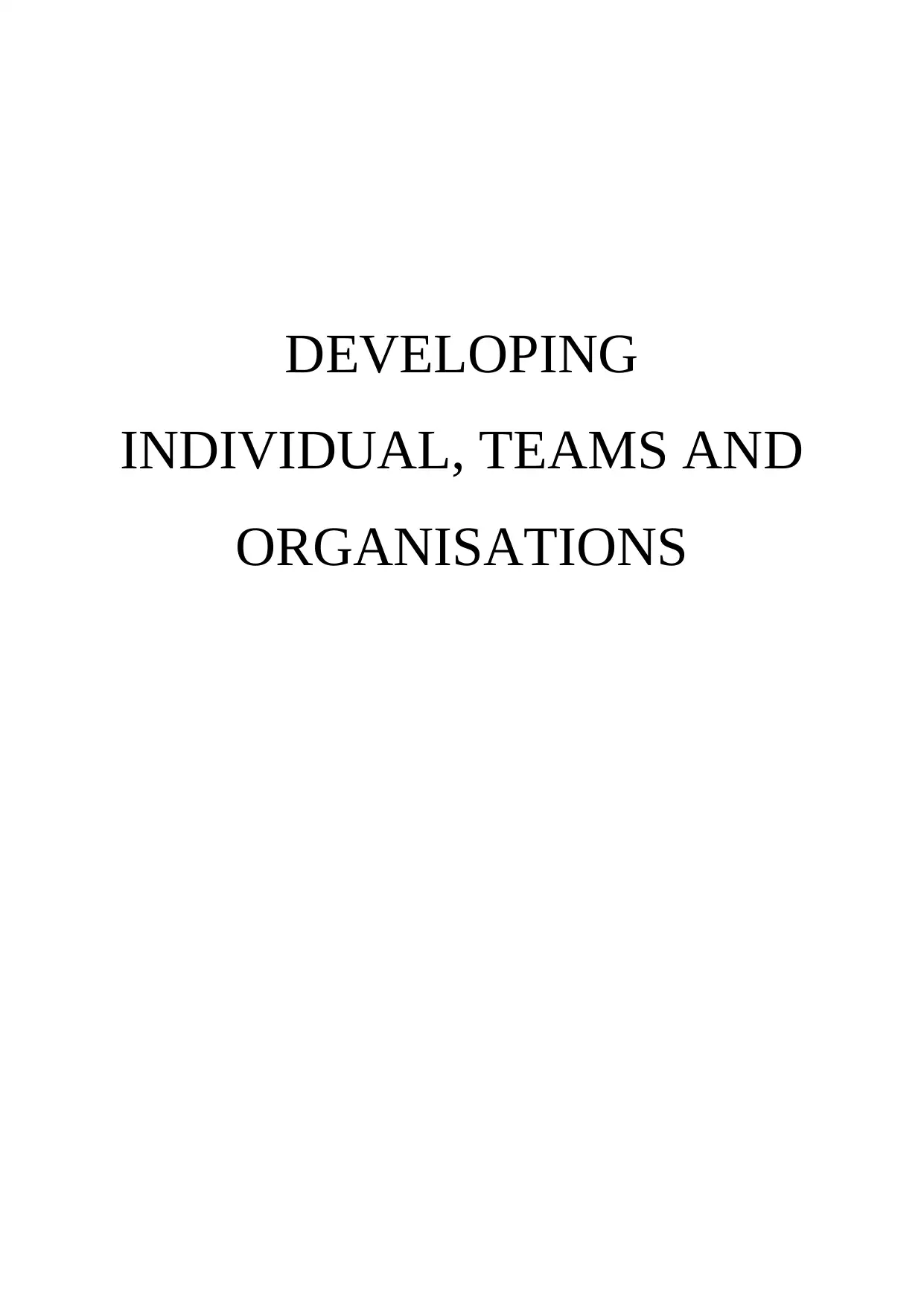
DEVELOPING
INDIVIDUAL, TEAMS AND
ORGANISATIONS
INDIVIDUAL, TEAMS AND
ORGANISATIONS
Paraphrase This Document
Need a fresh take? Get an instant paraphrase of this document with our AI Paraphraser
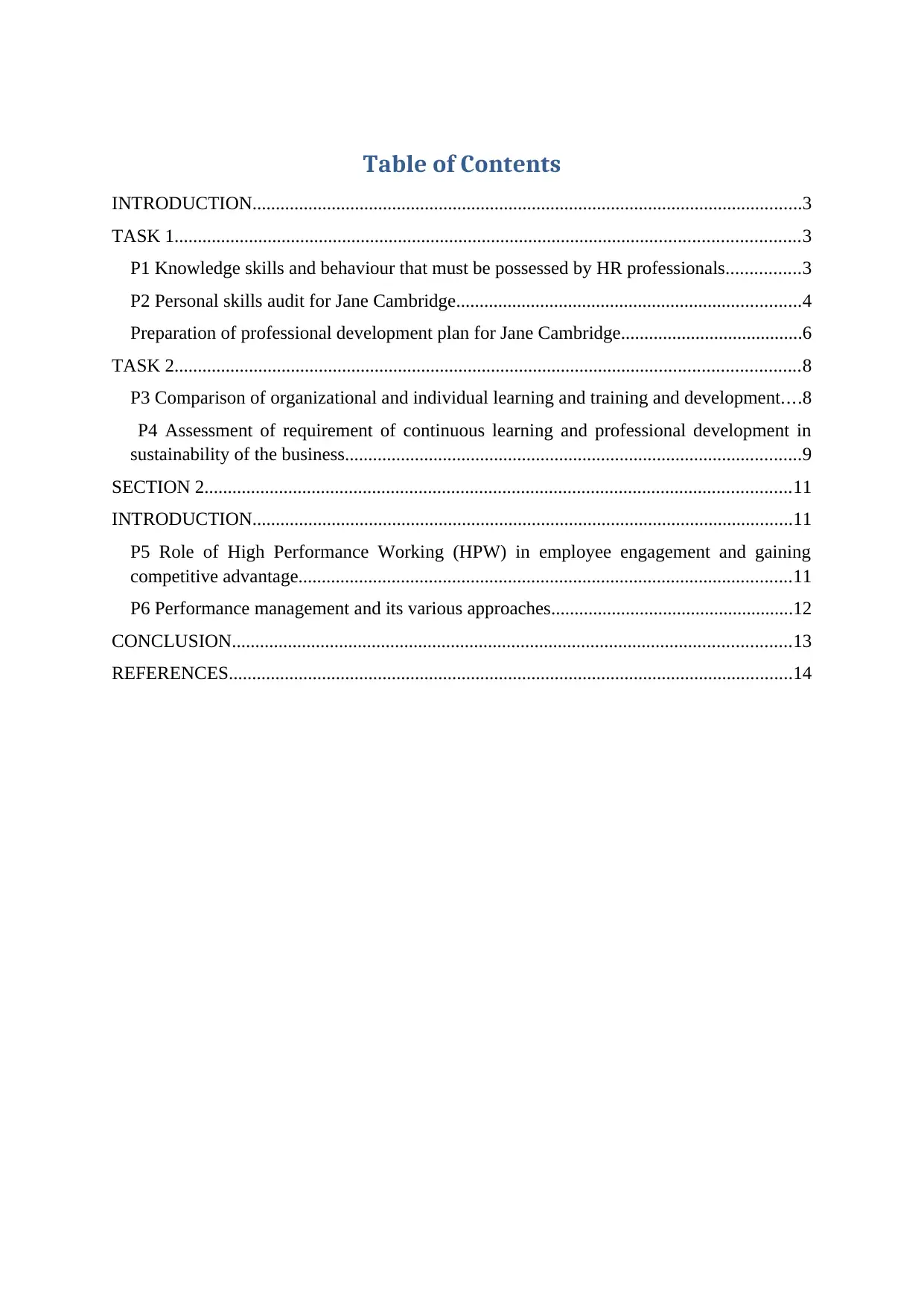
Table of Contents
INTRODUCTION......................................................................................................................3
TASK 1......................................................................................................................................3
P1 Knowledge skills and behaviour that must be possessed by HR professionals................3
P2 Personal skills audit for Jane Cambridge..........................................................................4
Preparation of professional development plan for Jane Cambridge.......................................6
TASK 2......................................................................................................................................8
P3 Comparison of organizational and individual learning and training and development....8
P4 Assessment of requirement of continuous learning and professional development in
sustainability of the business..................................................................................................9
SECTION 2..............................................................................................................................11
INTRODUCTION....................................................................................................................11
P5 Role of High Performance Working (HPW) in employee engagement and gaining
competitive advantage..........................................................................................................11
P6 Performance management and its various approaches....................................................12
CONCLUSION........................................................................................................................13
REFERENCES.........................................................................................................................14
INTRODUCTION......................................................................................................................3
TASK 1......................................................................................................................................3
P1 Knowledge skills and behaviour that must be possessed by HR professionals................3
P2 Personal skills audit for Jane Cambridge..........................................................................4
Preparation of professional development plan for Jane Cambridge.......................................6
TASK 2......................................................................................................................................8
P3 Comparison of organizational and individual learning and training and development....8
P4 Assessment of requirement of continuous learning and professional development in
sustainability of the business..................................................................................................9
SECTION 2..............................................................................................................................11
INTRODUCTION....................................................................................................................11
P5 Role of High Performance Working (HPW) in employee engagement and gaining
competitive advantage..........................................................................................................11
P6 Performance management and its various approaches....................................................12
CONCLUSION........................................................................................................................13
REFERENCES.........................................................................................................................14
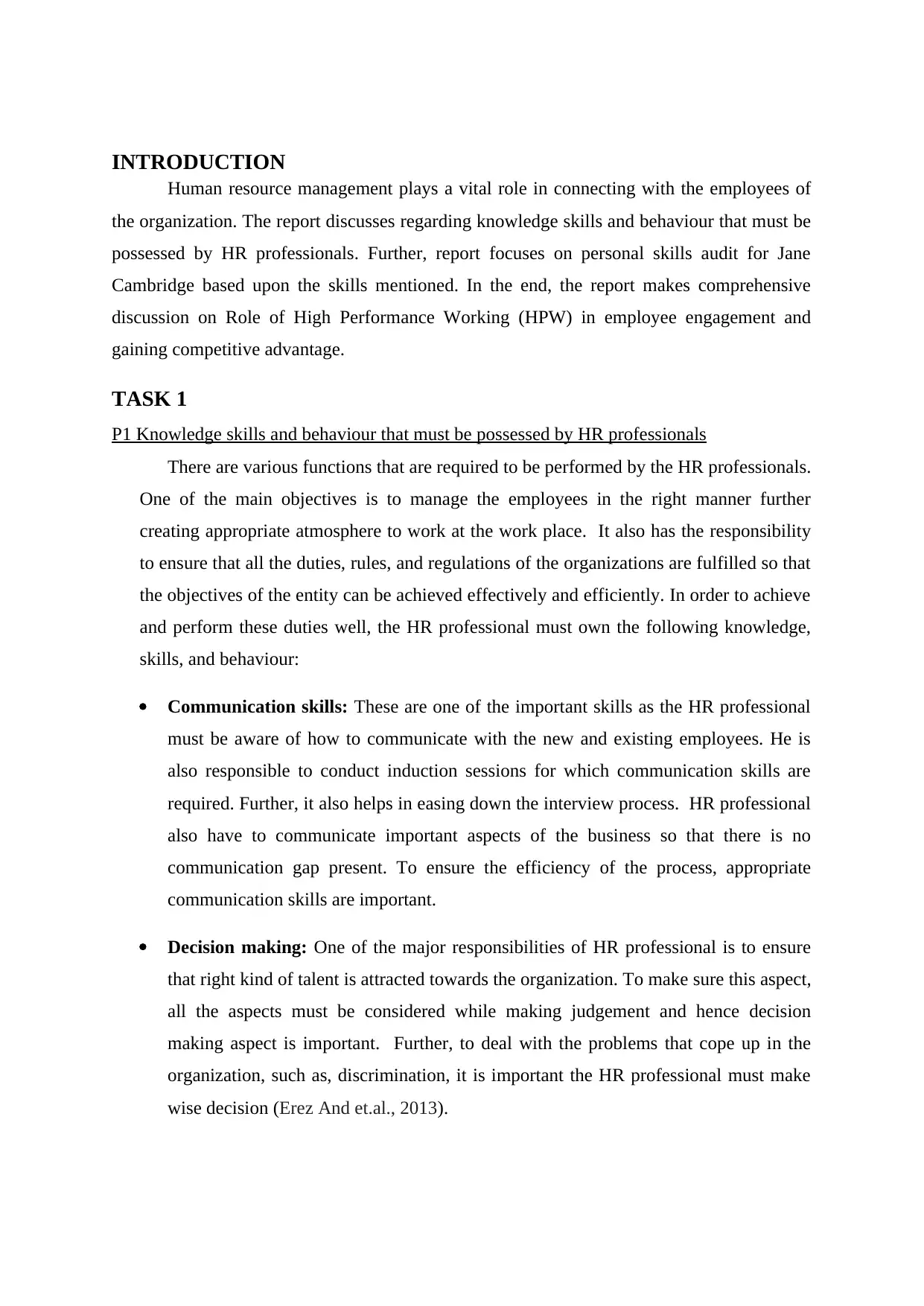
INTRODUCTION
Human resource management plays a vital role in connecting with the employees of
the organization. The report discusses regarding knowledge skills and behaviour that must be
possessed by HR professionals. Further, report focuses on personal skills audit for Jane
Cambridge based upon the skills mentioned. In the end, the report makes comprehensive
discussion on Role of High Performance Working (HPW) in employee engagement and
gaining competitive advantage.
TASK 1
P1 Knowledge skills and behaviour that must be possessed by HR professionals
There are various functions that are required to be performed by the HR professionals.
One of the main objectives is to manage the employees in the right manner further
creating appropriate atmosphere to work at the work place. It also has the responsibility
to ensure that all the duties, rules, and regulations of the organizations are fulfilled so that
the objectives of the entity can be achieved effectively and efficiently. In order to achieve
and perform these duties well, the HR professional must own the following knowledge,
skills, and behaviour:
Communication skills: These are one of the important skills as the HR professional
must be aware of how to communicate with the new and existing employees. He is
also responsible to conduct induction sessions for which communication skills are
required. Further, it also helps in easing down the interview process. HR professional
also have to communicate important aspects of the business so that there is no
communication gap present. To ensure the efficiency of the process, appropriate
communication skills are important.
Decision making: One of the major responsibilities of HR professional is to ensure
that right kind of talent is attracted towards the organization. To make sure this aspect,
all the aspects must be considered while making judgement and hence decision
making aspect is important. Further, to deal with the problems that cope up in the
organization, such as, discrimination, it is important the HR professional must make
wise decision (Erez And et.al., 2013).
Human resource management plays a vital role in connecting with the employees of
the organization. The report discusses regarding knowledge skills and behaviour that must be
possessed by HR professionals. Further, report focuses on personal skills audit for Jane
Cambridge based upon the skills mentioned. In the end, the report makes comprehensive
discussion on Role of High Performance Working (HPW) in employee engagement and
gaining competitive advantage.
TASK 1
P1 Knowledge skills and behaviour that must be possessed by HR professionals
There are various functions that are required to be performed by the HR professionals.
One of the main objectives is to manage the employees in the right manner further
creating appropriate atmosphere to work at the work place. It also has the responsibility
to ensure that all the duties, rules, and regulations of the organizations are fulfilled so that
the objectives of the entity can be achieved effectively and efficiently. In order to achieve
and perform these duties well, the HR professional must own the following knowledge,
skills, and behaviour:
Communication skills: These are one of the important skills as the HR professional
must be aware of how to communicate with the new and existing employees. He is
also responsible to conduct induction sessions for which communication skills are
required. Further, it also helps in easing down the interview process. HR professional
also have to communicate important aspects of the business so that there is no
communication gap present. To ensure the efficiency of the process, appropriate
communication skills are important.
Decision making: One of the major responsibilities of HR professional is to ensure
that right kind of talent is attracted towards the organization. To make sure this aspect,
all the aspects must be considered while making judgement and hence decision
making aspect is important. Further, to deal with the problems that cope up in the
organization, such as, discrimination, it is important the HR professional must make
wise decision (Erez And et.al., 2013).
⊘ This is a preview!⊘
Do you want full access?
Subscribe today to unlock all pages.

Trusted by 1+ million students worldwide
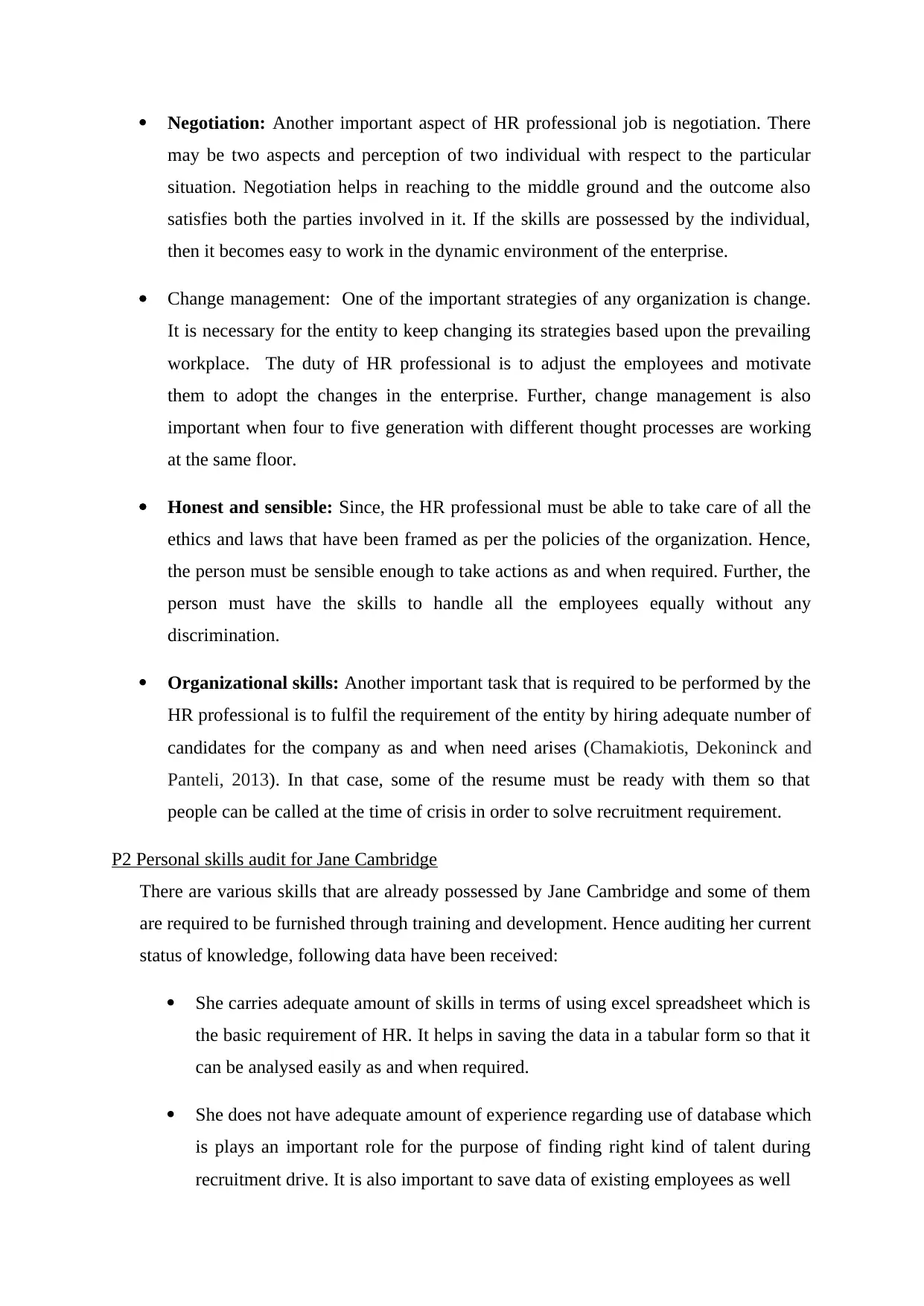
Negotiation: Another important aspect of HR professional job is negotiation. There
may be two aspects and perception of two individual with respect to the particular
situation. Negotiation helps in reaching to the middle ground and the outcome also
satisfies both the parties involved in it. If the skills are possessed by the individual,
then it becomes easy to work in the dynamic environment of the enterprise.
Change management: One of the important strategies of any organization is change.
It is necessary for the entity to keep changing its strategies based upon the prevailing
workplace. The duty of HR professional is to adjust the employees and motivate
them to adopt the changes in the enterprise. Further, change management is also
important when four to five generation with different thought processes are working
at the same floor.
Honest and sensible: Since, the HR professional must be able to take care of all the
ethics and laws that have been framed as per the policies of the organization. Hence,
the person must be sensible enough to take actions as and when required. Further, the
person must have the skills to handle all the employees equally without any
discrimination.
Organizational skills: Another important task that is required to be performed by the
HR professional is to fulfil the requirement of the entity by hiring adequate number of
candidates for the company as and when need arises (Chamakiotis, Dekoninck and
Panteli, 2013). In that case, some of the resume must be ready with them so that
people can be called at the time of crisis in order to solve recruitment requirement.
P2 Personal skills audit for Jane Cambridge
There are various skills that are already possessed by Jane Cambridge and some of them
are required to be furnished through training and development. Hence auditing her current
status of knowledge, following data have been received:
She carries adequate amount of skills in terms of using excel spreadsheet which is
the basic requirement of HR. It helps in saving the data in a tabular form so that it
can be analysed easily as and when required.
She does not have adequate amount of experience regarding use of database which
is plays an important role for the purpose of finding right kind of talent during
recruitment drive. It is also important to save data of existing employees as well
may be two aspects and perception of two individual with respect to the particular
situation. Negotiation helps in reaching to the middle ground and the outcome also
satisfies both the parties involved in it. If the skills are possessed by the individual,
then it becomes easy to work in the dynamic environment of the enterprise.
Change management: One of the important strategies of any organization is change.
It is necessary for the entity to keep changing its strategies based upon the prevailing
workplace. The duty of HR professional is to adjust the employees and motivate
them to adopt the changes in the enterprise. Further, change management is also
important when four to five generation with different thought processes are working
at the same floor.
Honest and sensible: Since, the HR professional must be able to take care of all the
ethics and laws that have been framed as per the policies of the organization. Hence,
the person must be sensible enough to take actions as and when required. Further, the
person must have the skills to handle all the employees equally without any
discrimination.
Organizational skills: Another important task that is required to be performed by the
HR professional is to fulfil the requirement of the entity by hiring adequate number of
candidates for the company as and when need arises (Chamakiotis, Dekoninck and
Panteli, 2013). In that case, some of the resume must be ready with them so that
people can be called at the time of crisis in order to solve recruitment requirement.
P2 Personal skills audit for Jane Cambridge
There are various skills that are already possessed by Jane Cambridge and some of them
are required to be furnished through training and development. Hence auditing her current
status of knowledge, following data have been received:
She carries adequate amount of skills in terms of using excel spreadsheet which is
the basic requirement of HR. It helps in saving the data in a tabular form so that it
can be analysed easily as and when required.
She does not have adequate amount of experience regarding use of database which
is plays an important role for the purpose of finding right kind of talent during
recruitment drive. It is also important to save data of existing employees as well
Paraphrase This Document
Need a fresh take? Get an instant paraphrase of this document with our AI Paraphraser
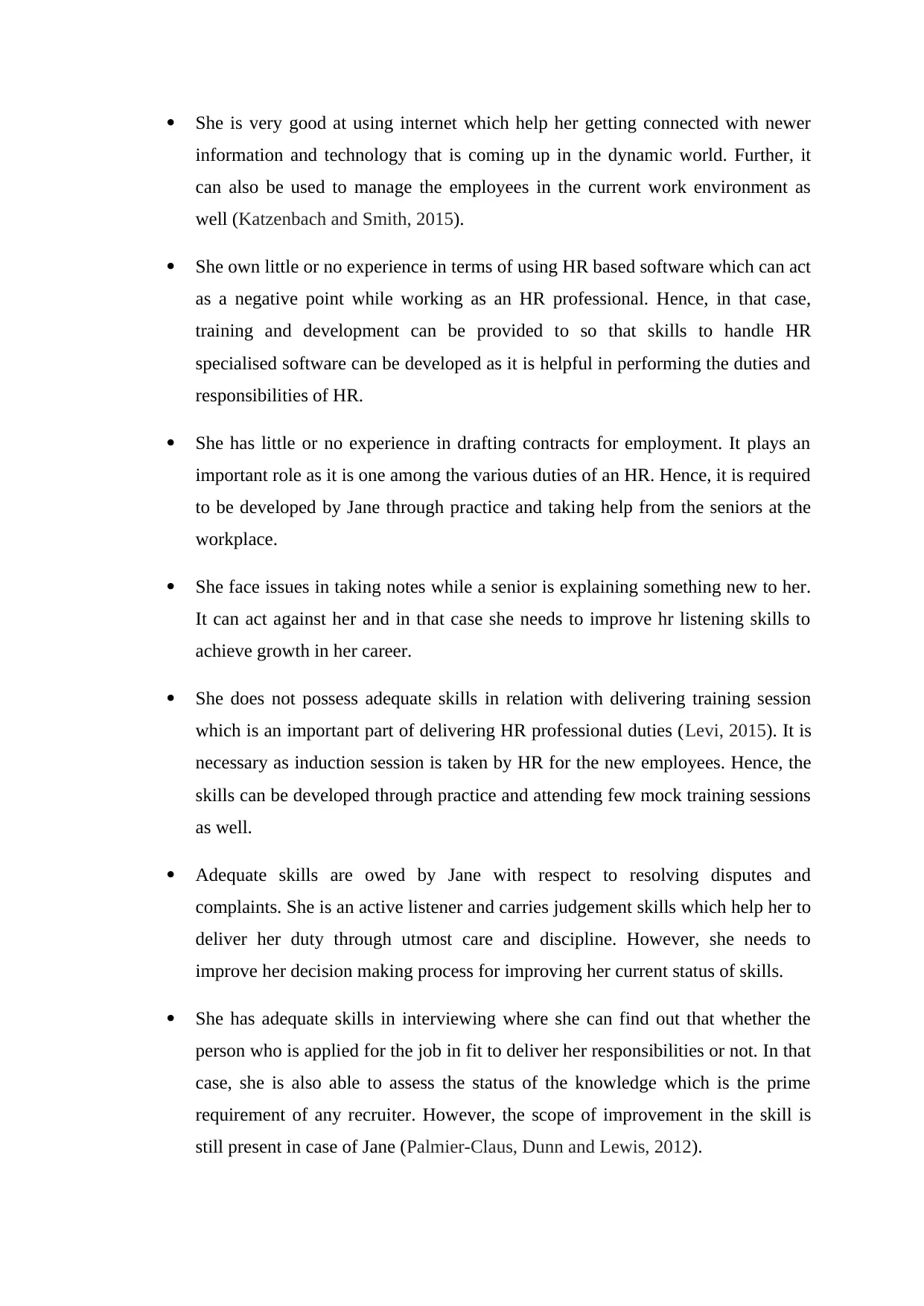
She is very good at using internet which help her getting connected with newer
information and technology that is coming up in the dynamic world. Further, it
can also be used to manage the employees in the current work environment as
well (Katzenbach and Smith, 2015).
She own little or no experience in terms of using HR based software which can act
as a negative point while working as an HR professional. Hence, in that case,
training and development can be provided to so that skills to handle HR
specialised software can be developed as it is helpful in performing the duties and
responsibilities of HR.
She has little or no experience in drafting contracts for employment. It plays an
important role as it is one among the various duties of an HR. Hence, it is required
to be developed by Jane through practice and taking help from the seniors at the
workplace.
She face issues in taking notes while a senior is explaining something new to her.
It can act against her and in that case she needs to improve hr listening skills to
achieve growth in her career.
She does not possess adequate skills in relation with delivering training session
which is an important part of delivering HR professional duties (Levi, 2015). It is
necessary as induction session is taken by HR for the new employees. Hence, the
skills can be developed through practice and attending few mock training sessions
as well.
Adequate skills are owed by Jane with respect to resolving disputes and
complaints. She is an active listener and carries judgement skills which help her to
deliver her duty through utmost care and discipline. However, she needs to
improve her decision making process for improving her current status of skills.
She has adequate skills in interviewing where she can find out that whether the
person who is applied for the job in fit to deliver her responsibilities or not. In that
case, she is also able to assess the status of the knowledge which is the prime
requirement of any recruiter. However, the scope of improvement in the skill is
still present in case of Jane (Palmier-Claus, Dunn and Lewis, 2012).
information and technology that is coming up in the dynamic world. Further, it
can also be used to manage the employees in the current work environment as
well (Katzenbach and Smith, 2015).
She own little or no experience in terms of using HR based software which can act
as a negative point while working as an HR professional. Hence, in that case,
training and development can be provided to so that skills to handle HR
specialised software can be developed as it is helpful in performing the duties and
responsibilities of HR.
She has little or no experience in drafting contracts for employment. It plays an
important role as it is one among the various duties of an HR. Hence, it is required
to be developed by Jane through practice and taking help from the seniors at the
workplace.
She face issues in taking notes while a senior is explaining something new to her.
It can act against her and in that case she needs to improve hr listening skills to
achieve growth in her career.
She does not possess adequate skills in relation with delivering training session
which is an important part of delivering HR professional duties (Levi, 2015). It is
necessary as induction session is taken by HR for the new employees. Hence, the
skills can be developed through practice and attending few mock training sessions
as well.
Adequate skills are owed by Jane with respect to resolving disputes and
complaints. She is an active listener and carries judgement skills which help her to
deliver her duty through utmost care and discipline. However, she needs to
improve her decision making process for improving her current status of skills.
She has adequate skills in interviewing where she can find out that whether the
person who is applied for the job in fit to deliver her responsibilities or not. In that
case, she is also able to assess the status of the knowledge which is the prime
requirement of any recruiter. However, the scope of improvement in the skill is
still present in case of Jane (Palmier-Claus, Dunn and Lewis, 2012).
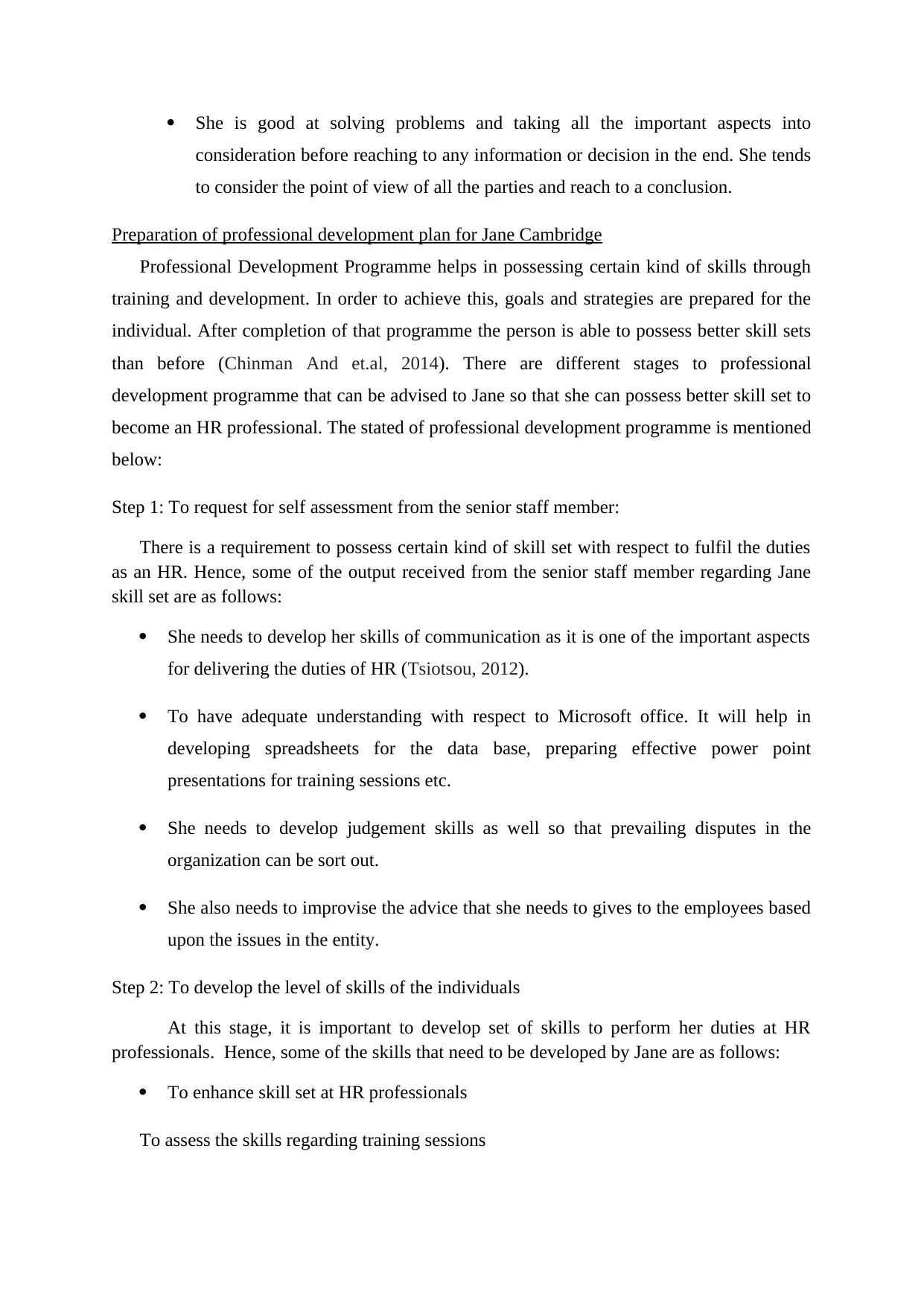
She is good at solving problems and taking all the important aspects into
consideration before reaching to any information or decision in the end. She tends
to consider the point of view of all the parties and reach to a conclusion.
Preparation of professional development plan for Jane Cambridge
Professional Development Programme helps in possessing certain kind of skills through
training and development. In order to achieve this, goals and strategies are prepared for the
individual. After completion of that programme the person is able to possess better skill sets
than before (Chinman And et.al, 2014). There are different stages to professional
development programme that can be advised to Jane so that she can possess better skill set to
become an HR professional. The stated of professional development programme is mentioned
below:
Step 1: To request for self assessment from the senior staff member:
There is a requirement to possess certain kind of skill set with respect to fulfil the duties
as an HR. Hence, some of the output received from the senior staff member regarding Jane
skill set are as follows:
She needs to develop her skills of communication as it is one of the important aspects
for delivering the duties of HR (Tsiotsou, 2012).
To have adequate understanding with respect to Microsoft office. It will help in
developing spreadsheets for the data base, preparing effective power point
presentations for training sessions etc.
She needs to develop judgement skills as well so that prevailing disputes in the
organization can be sort out.
She also needs to improvise the advice that she needs to gives to the employees based
upon the issues in the entity.
Step 2: To develop the level of skills of the individuals
At this stage, it is important to develop set of skills to perform her duties at HR
professionals. Hence, some of the skills that need to be developed by Jane are as follows:
To enhance skill set at HR professionals
To assess the skills regarding training sessions
consideration before reaching to any information or decision in the end. She tends
to consider the point of view of all the parties and reach to a conclusion.
Preparation of professional development plan for Jane Cambridge
Professional Development Programme helps in possessing certain kind of skills through
training and development. In order to achieve this, goals and strategies are prepared for the
individual. After completion of that programme the person is able to possess better skill sets
than before (Chinman And et.al, 2014). There are different stages to professional
development programme that can be advised to Jane so that she can possess better skill set to
become an HR professional. The stated of professional development programme is mentioned
below:
Step 1: To request for self assessment from the senior staff member:
There is a requirement to possess certain kind of skill set with respect to fulfil the duties
as an HR. Hence, some of the output received from the senior staff member regarding Jane
skill set are as follows:
She needs to develop her skills of communication as it is one of the important aspects
for delivering the duties of HR (Tsiotsou, 2012).
To have adequate understanding with respect to Microsoft office. It will help in
developing spreadsheets for the data base, preparing effective power point
presentations for training sessions etc.
She needs to develop judgement skills as well so that prevailing disputes in the
organization can be sort out.
She also needs to improvise the advice that she needs to gives to the employees based
upon the issues in the entity.
Step 2: To develop the level of skills of the individuals
At this stage, it is important to develop set of skills to perform her duties at HR
professionals. Hence, some of the skills that need to be developed by Jane are as follows:
To enhance skill set at HR professionals
To assess the skills regarding training sessions
⊘ This is a preview!⊘
Do you want full access?
Subscribe today to unlock all pages.

Trusted by 1+ million students worldwide
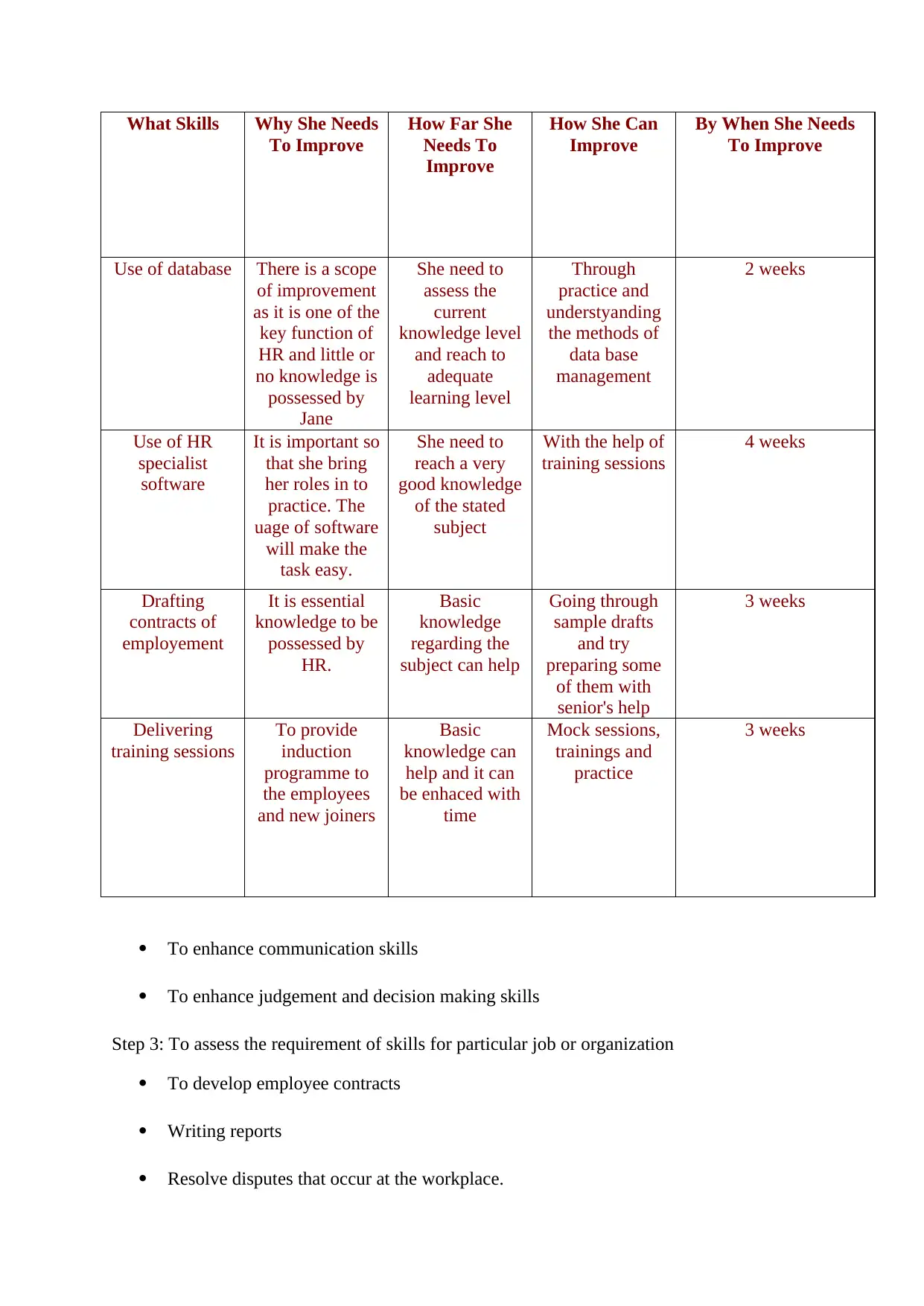
What Skills Why She Needs
To Improve
How Far She
Needs To
Improve
How She Can
Improve
By When She Needs
To Improve
Use of database There is a scope
of improvement
as it is one of the
key function of
HR and little or
no knowledge is
possessed by
Jane
She need to
assess the
current
knowledge level
and reach to
adequate
learning level
Through
practice and
understyanding
the methods of
data base
management
2 weeks
Use of HR
specialist
software
It is important so
that she bring
her roles in to
practice. The
uage of software
will make the
task easy.
She need to
reach a very
good knowledge
of the stated
subject
With the help of
training sessions
4 weeks
Drafting
contracts of
employement
It is essential
knowledge to be
possessed by
HR.
Basic
knowledge
regarding the
subject can help
Going through
sample drafts
and try
preparing some
of them with
senior's help
3 weeks
Delivering
training sessions
To provide
induction
programme to
the employees
and new joiners
Basic
knowledge can
help and it can
be enhaced with
time
Mock sessions,
trainings and
practice
3 weeks
To enhance communication skills
To enhance judgement and decision making skills
Step 3: To assess the requirement of skills for particular job or organization
To develop employee contracts
Writing reports
Resolve disputes that occur at the workplace.
To Improve
How Far She
Needs To
Improve
How She Can
Improve
By When She Needs
To Improve
Use of database There is a scope
of improvement
as it is one of the
key function of
HR and little or
no knowledge is
possessed by
Jane
She need to
assess the
current
knowledge level
and reach to
adequate
learning level
Through
practice and
understyanding
the methods of
data base
management
2 weeks
Use of HR
specialist
software
It is important so
that she bring
her roles in to
practice. The
uage of software
will make the
task easy.
She need to
reach a very
good knowledge
of the stated
subject
With the help of
training sessions
4 weeks
Drafting
contracts of
employement
It is essential
knowledge to be
possessed by
HR.
Basic
knowledge
regarding the
subject can help
Going through
sample drafts
and try
preparing some
of them with
senior's help
3 weeks
Delivering
training sessions
To provide
induction
programme to
the employees
and new joiners
Basic
knowledge can
help and it can
be enhaced with
time
Mock sessions,
trainings and
practice
3 weeks
To enhance communication skills
To enhance judgement and decision making skills
Step 3: To assess the requirement of skills for particular job or organization
To develop employee contracts
Writing reports
Resolve disputes that occur at the workplace.
Paraphrase This Document
Need a fresh take? Get an instant paraphrase of this document with our AI Paraphraser
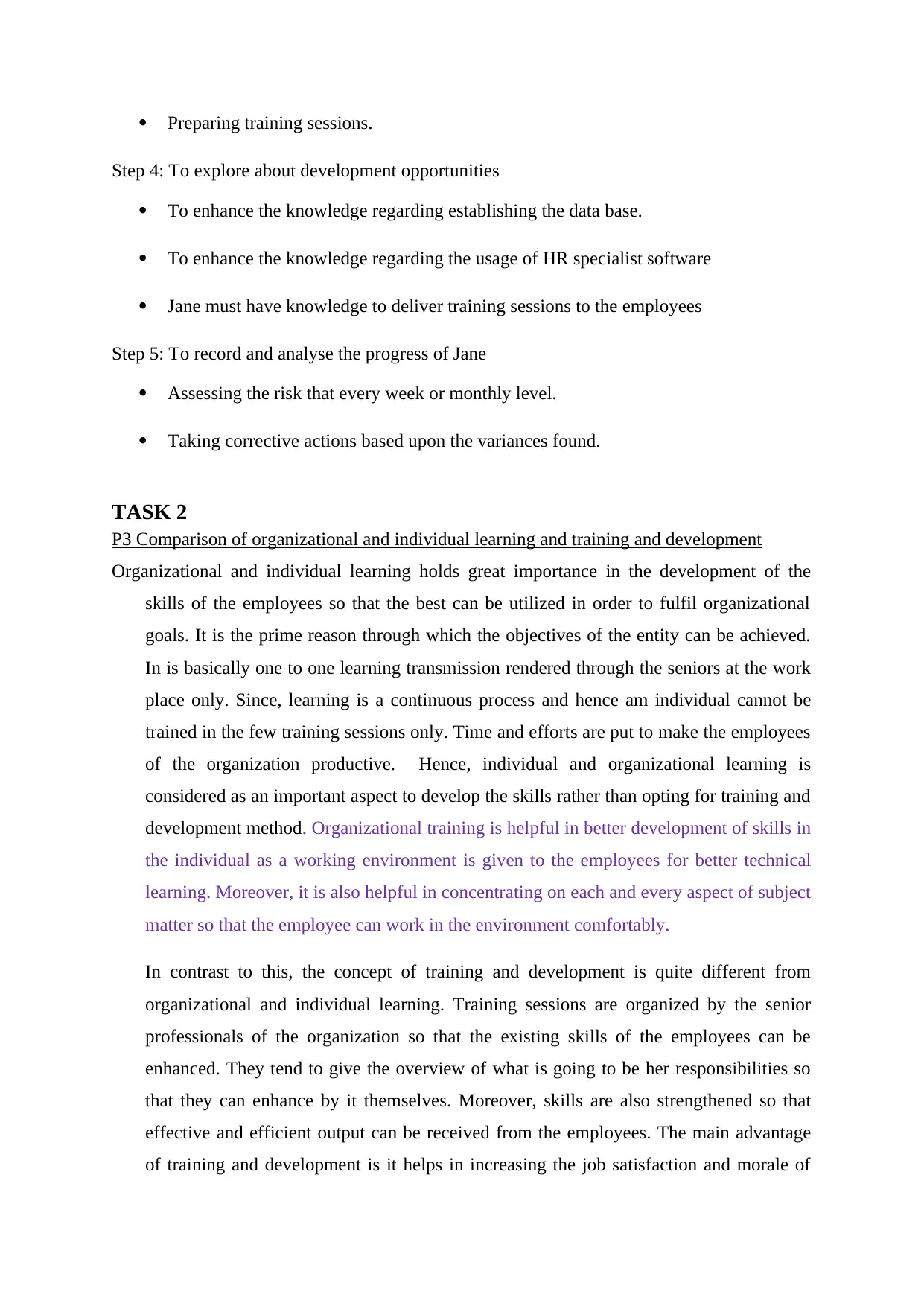
Preparing training sessions.
Step 4: To explore about development opportunities
To enhance the knowledge regarding establishing the data base.
To enhance the knowledge regarding the usage of HR specialist software
Jane must have knowledge to deliver training sessions to the employees
Step 5: To record and analyse the progress of Jane
Assessing the risk that every week or monthly level.
Taking corrective actions based upon the variances found.
TASK 2
P3 Comparison of organizational and individual learning and training and development
Organizational and individual learning holds great importance in the development of the
skills of the employees so that the best can be utilized in order to fulfil organizational
goals. It is the prime reason through which the objectives of the entity can be achieved.
In is basically one to one learning transmission rendered through the seniors at the work
place only. Since, learning is a continuous process and hence am individual cannot be
trained in the few training sessions only. Time and efforts are put to make the employees
of the organization productive. Hence, individual and organizational learning is
considered as an important aspect to develop the skills rather than opting for training and
development method. Organizational training is helpful in better development of skills in
the individual as a working environment is given to the employees for better technical
learning. Moreover, it is also helpful in concentrating on each and every aspect of subject
matter so that the employee can work in the environment comfortably.
In contrast to this, the concept of training and development is quite different from
organizational and individual learning. Training sessions are organized by the senior
professionals of the organization so that the existing skills of the employees can be
enhanced. They tend to give the overview of what is going to be her responsibilities so
that they can enhance by it themselves. Moreover, skills are also strengthened so that
effective and efficient output can be received from the employees. The main advantage
of training and development is it helps in increasing the job satisfaction and morale of
Step 4: To explore about development opportunities
To enhance the knowledge regarding establishing the data base.
To enhance the knowledge regarding the usage of HR specialist software
Jane must have knowledge to deliver training sessions to the employees
Step 5: To record and analyse the progress of Jane
Assessing the risk that every week or monthly level.
Taking corrective actions based upon the variances found.
TASK 2
P3 Comparison of organizational and individual learning and training and development
Organizational and individual learning holds great importance in the development of the
skills of the employees so that the best can be utilized in order to fulfil organizational
goals. It is the prime reason through which the objectives of the entity can be achieved.
In is basically one to one learning transmission rendered through the seniors at the work
place only. Since, learning is a continuous process and hence am individual cannot be
trained in the few training sessions only. Time and efforts are put to make the employees
of the organization productive. Hence, individual and organizational learning is
considered as an important aspect to develop the skills rather than opting for training and
development method. Organizational training is helpful in better development of skills in
the individual as a working environment is given to the employees for better technical
learning. Moreover, it is also helpful in concentrating on each and every aspect of subject
matter so that the employee can work in the environment comfortably.
In contrast to this, the concept of training and development is quite different from
organizational and individual learning. Training sessions are organized by the senior
professionals of the organization so that the existing skills of the employees can be
enhanced. They tend to give the overview of what is going to be her responsibilities so
that they can enhance by it themselves. Moreover, skills are also strengthened so that
effective and efficient output can be received from the employees. The main advantage
of training and development is it helps in increasing the job satisfaction and morale of
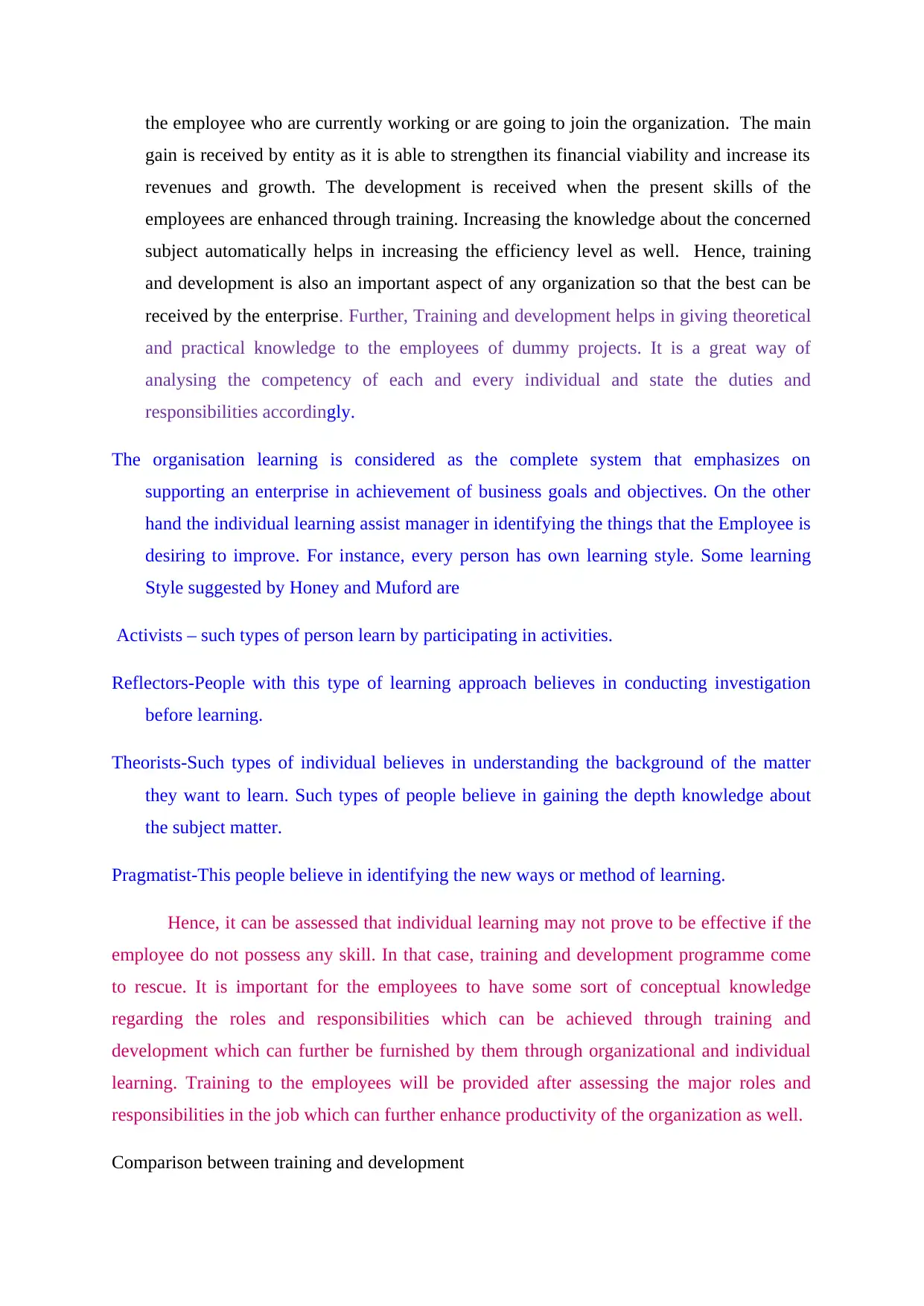
the employee who are currently working or are going to join the organization. The main
gain is received by entity as it is able to strengthen its financial viability and increase its
revenues and growth. The development is received when the present skills of the
employees are enhanced through training. Increasing the knowledge about the concerned
subject automatically helps in increasing the efficiency level as well. Hence, training
and development is also an important aspect of any organization so that the best can be
received by the enterprise. Further, Training and development helps in giving theoretical
and practical knowledge to the employees of dummy projects. It is a great way of
analysing the competency of each and every individual and state the duties and
responsibilities accordingly.
The organisation learning is considered as the complete system that emphasizes on
supporting an enterprise in achievement of business goals and objectives. On the other
hand the individual learning assist manager in identifying the things that the Employee is
desiring to improve. For instance, every person has own learning style. Some learning
Style suggested by Honey and Muford are
Activists – such types of person learn by participating in activities.
Reflectors-People with this type of learning approach believes in conducting investigation
before learning.
Theorists-Such types of individual believes in understanding the background of the matter
they want to learn. Such types of people believe in gaining the depth knowledge about
the subject matter.
Pragmatist-This people believe in identifying the new ways or method of learning.
Hence, it can be assessed that individual learning may not prove to be effective if the
employee do not possess any skill. In that case, training and development programme come
to rescue. It is important for the employees to have some sort of conceptual knowledge
regarding the roles and responsibilities which can be achieved through training and
development which can further be furnished by them through organizational and individual
learning. Training to the employees will be provided after assessing the major roles and
responsibilities in the job which can further enhance productivity of the organization as well.
Comparison between training and development
gain is received by entity as it is able to strengthen its financial viability and increase its
revenues and growth. The development is received when the present skills of the
employees are enhanced through training. Increasing the knowledge about the concerned
subject automatically helps in increasing the efficiency level as well. Hence, training
and development is also an important aspect of any organization so that the best can be
received by the enterprise. Further, Training and development helps in giving theoretical
and practical knowledge to the employees of dummy projects. It is a great way of
analysing the competency of each and every individual and state the duties and
responsibilities accordingly.
The organisation learning is considered as the complete system that emphasizes on
supporting an enterprise in achievement of business goals and objectives. On the other
hand the individual learning assist manager in identifying the things that the Employee is
desiring to improve. For instance, every person has own learning style. Some learning
Style suggested by Honey and Muford are
Activists – such types of person learn by participating in activities.
Reflectors-People with this type of learning approach believes in conducting investigation
before learning.
Theorists-Such types of individual believes in understanding the background of the matter
they want to learn. Such types of people believe in gaining the depth knowledge about
the subject matter.
Pragmatist-This people believe in identifying the new ways or method of learning.
Hence, it can be assessed that individual learning may not prove to be effective if the
employee do not possess any skill. In that case, training and development programme come
to rescue. It is important for the employees to have some sort of conceptual knowledge
regarding the roles and responsibilities which can be achieved through training and
development which can further be furnished by them through organizational and individual
learning. Training to the employees will be provided after assessing the major roles and
responsibilities in the job which can further enhance productivity of the organization as well.
Comparison between training and development
⊘ This is a preview!⊘
Do you want full access?
Subscribe today to unlock all pages.

Trusted by 1+ million students worldwide
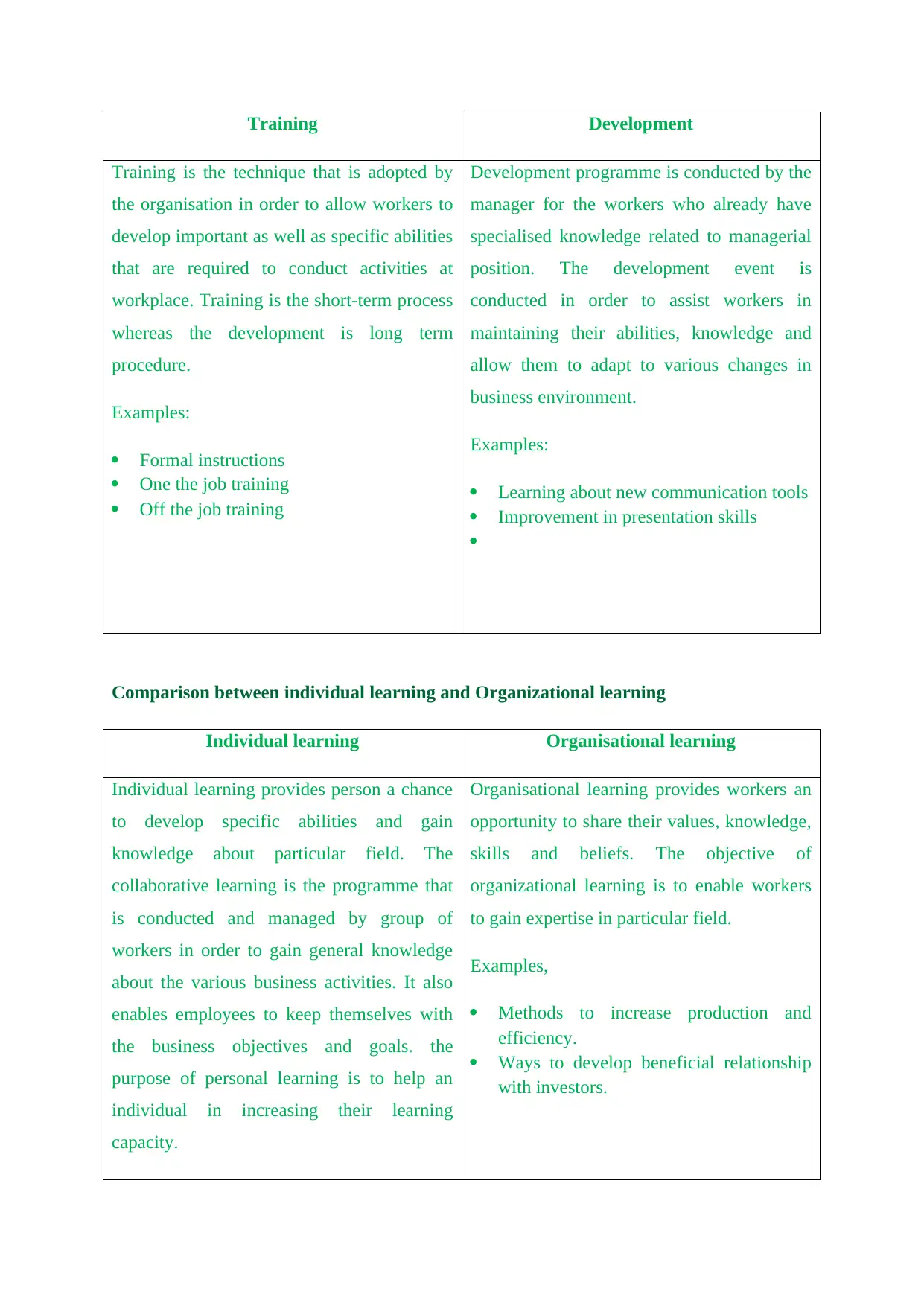
Training Development
Training is the technique that is adopted by
the organisation in order to allow workers to
develop important as well as specific abilities
that are required to conduct activities at
workplace. Training is the short-term process
whereas the development is long term
procedure.
Examples:
Formal instructions
One the job training
Off the job training
Development programme is conducted by the
manager for the workers who already have
specialised knowledge related to managerial
position. The development event is
conducted in order to assist workers in
maintaining their abilities, knowledge and
allow them to adapt to various changes in
business environment.
Examples:
Learning about new communication tools
Improvement in presentation skills
Comparison between individual learning and Organizational learning
Individual learning Organisational learning
Individual learning provides person a chance
to develop specific abilities and gain
knowledge about particular field. The
collaborative learning is the programme that
is conducted and managed by group of
workers in order to gain general knowledge
about the various business activities. It also
enables employees to keep themselves with
the business objectives and goals. the
purpose of personal learning is to help an
individual in increasing their learning
capacity.
Organisational learning provides workers an
opportunity to share their values, knowledge,
skills and beliefs. The objective of
organizational learning is to enable workers
to gain expertise in particular field.
Examples,
Methods to increase production and
efficiency.
Ways to develop beneficial relationship
with investors.
Training is the technique that is adopted by
the organisation in order to allow workers to
develop important as well as specific abilities
that are required to conduct activities at
workplace. Training is the short-term process
whereas the development is long term
procedure.
Examples:
Formal instructions
One the job training
Off the job training
Development programme is conducted by the
manager for the workers who already have
specialised knowledge related to managerial
position. The development event is
conducted in order to assist workers in
maintaining their abilities, knowledge and
allow them to adapt to various changes in
business environment.
Examples:
Learning about new communication tools
Improvement in presentation skills
Comparison between individual learning and Organizational learning
Individual learning Organisational learning
Individual learning provides person a chance
to develop specific abilities and gain
knowledge about particular field. The
collaborative learning is the programme that
is conducted and managed by group of
workers in order to gain general knowledge
about the various business activities. It also
enables employees to keep themselves with
the business objectives and goals. the
purpose of personal learning is to help an
individual in increasing their learning
capacity.
Organisational learning provides workers an
opportunity to share their values, knowledge,
skills and beliefs. The objective of
organizational learning is to enable workers
to gain expertise in particular field.
Examples,
Methods to increase production and
efficiency.
Ways to develop beneficial relationship
with investors.
Paraphrase This Document
Need a fresh take? Get an instant paraphrase of this document with our AI Paraphraser
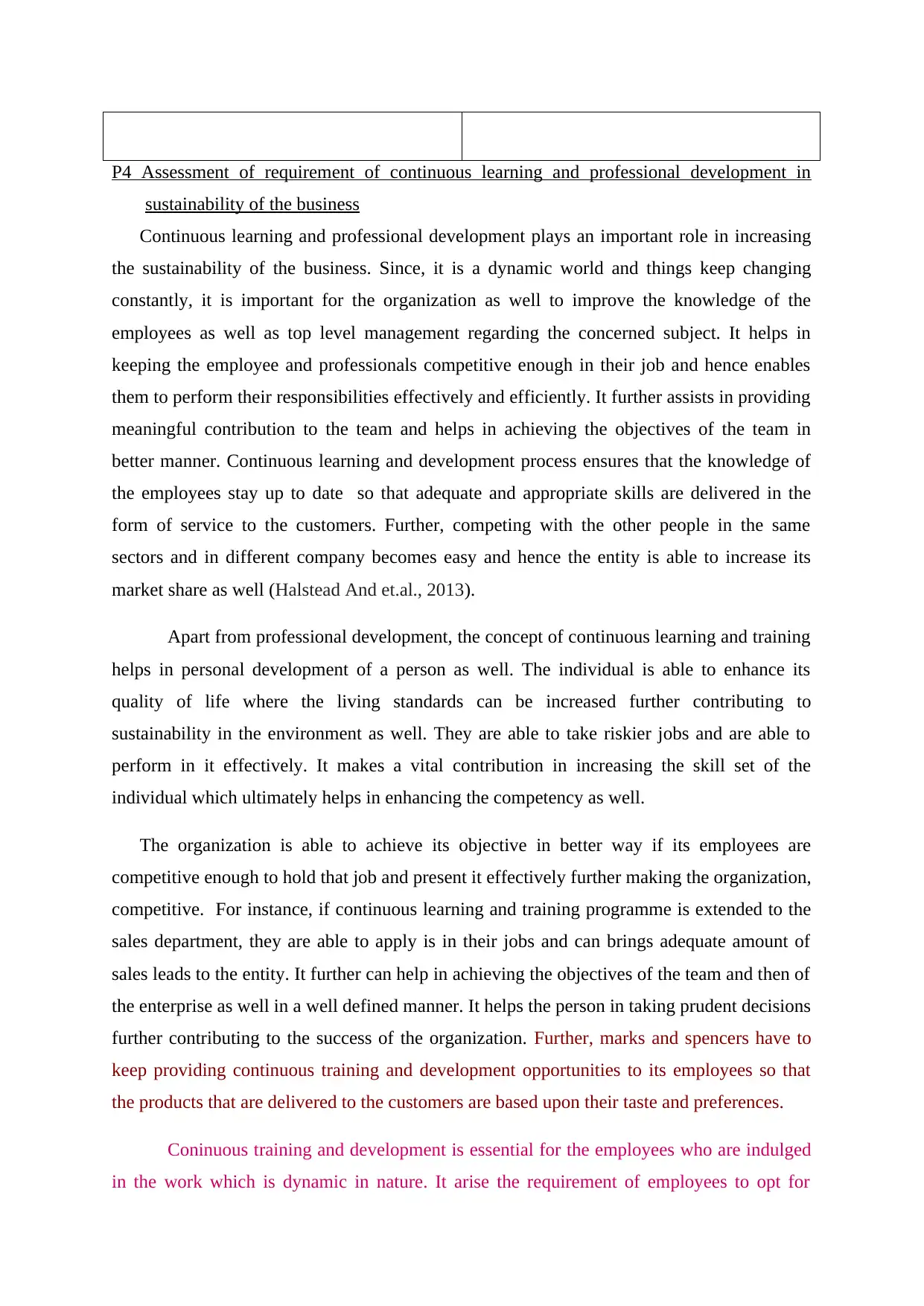
P4 Assessment of requirement of continuous learning and professional development in
sustainability of the business
Continuous learning and professional development plays an important role in increasing
the sustainability of the business. Since, it is a dynamic world and things keep changing
constantly, it is important for the organization as well to improve the knowledge of the
employees as well as top level management regarding the concerned subject. It helps in
keeping the employee and professionals competitive enough in their job and hence enables
them to perform their responsibilities effectively and efficiently. It further assists in providing
meaningful contribution to the team and helps in achieving the objectives of the team in
better manner. Continuous learning and development process ensures that the knowledge of
the employees stay up to date so that adequate and appropriate skills are delivered in the
form of service to the customers. Further, competing with the other people in the same
sectors and in different company becomes easy and hence the entity is able to increase its
market share as well (Halstead And et.al., 2013).
Apart from professional development, the concept of continuous learning and training
helps in personal development of a person as well. The individual is able to enhance its
quality of life where the living standards can be increased further contributing to
sustainability in the environment as well. They are able to take riskier jobs and are able to
perform in it effectively. It makes a vital contribution in increasing the skill set of the
individual which ultimately helps in enhancing the competency as well.
The organization is able to achieve its objective in better way if its employees are
competitive enough to hold that job and present it effectively further making the organization,
competitive. For instance, if continuous learning and training programme is extended to the
sales department, they are able to apply is in their jobs and can brings adequate amount of
sales leads to the entity. It further can help in achieving the objectives of the team and then of
the enterprise as well in a well defined manner. It helps the person in taking prudent decisions
further contributing to the success of the organization. Further, marks and spencers have to
keep providing continuous training and development opportunities to its employees so that
the products that are delivered to the customers are based upon their taste and preferences.
Coninuous training and development is essential for the employees who are indulged
in the work which is dynamic in nature. It arise the requirement of employees to opt for
sustainability of the business
Continuous learning and professional development plays an important role in increasing
the sustainability of the business. Since, it is a dynamic world and things keep changing
constantly, it is important for the organization as well to improve the knowledge of the
employees as well as top level management regarding the concerned subject. It helps in
keeping the employee and professionals competitive enough in their job and hence enables
them to perform their responsibilities effectively and efficiently. It further assists in providing
meaningful contribution to the team and helps in achieving the objectives of the team in
better manner. Continuous learning and development process ensures that the knowledge of
the employees stay up to date so that adequate and appropriate skills are delivered in the
form of service to the customers. Further, competing with the other people in the same
sectors and in different company becomes easy and hence the entity is able to increase its
market share as well (Halstead And et.al., 2013).
Apart from professional development, the concept of continuous learning and training
helps in personal development of a person as well. The individual is able to enhance its
quality of life where the living standards can be increased further contributing to
sustainability in the environment as well. They are able to take riskier jobs and are able to
perform in it effectively. It makes a vital contribution in increasing the skill set of the
individual which ultimately helps in enhancing the competency as well.
The organization is able to achieve its objective in better way if its employees are
competitive enough to hold that job and present it effectively further making the organization,
competitive. For instance, if continuous learning and training programme is extended to the
sales department, they are able to apply is in their jobs and can brings adequate amount of
sales leads to the entity. It further can help in achieving the objectives of the team and then of
the enterprise as well in a well defined manner. It helps the person in taking prudent decisions
further contributing to the success of the organization. Further, marks and spencers have to
keep providing continuous training and development opportunities to its employees so that
the products that are delivered to the customers are based upon their taste and preferences.
Coninuous training and development is essential for the employees who are indulged
in the work which is dynamic in nature. It arise the requirement of employees to opt for
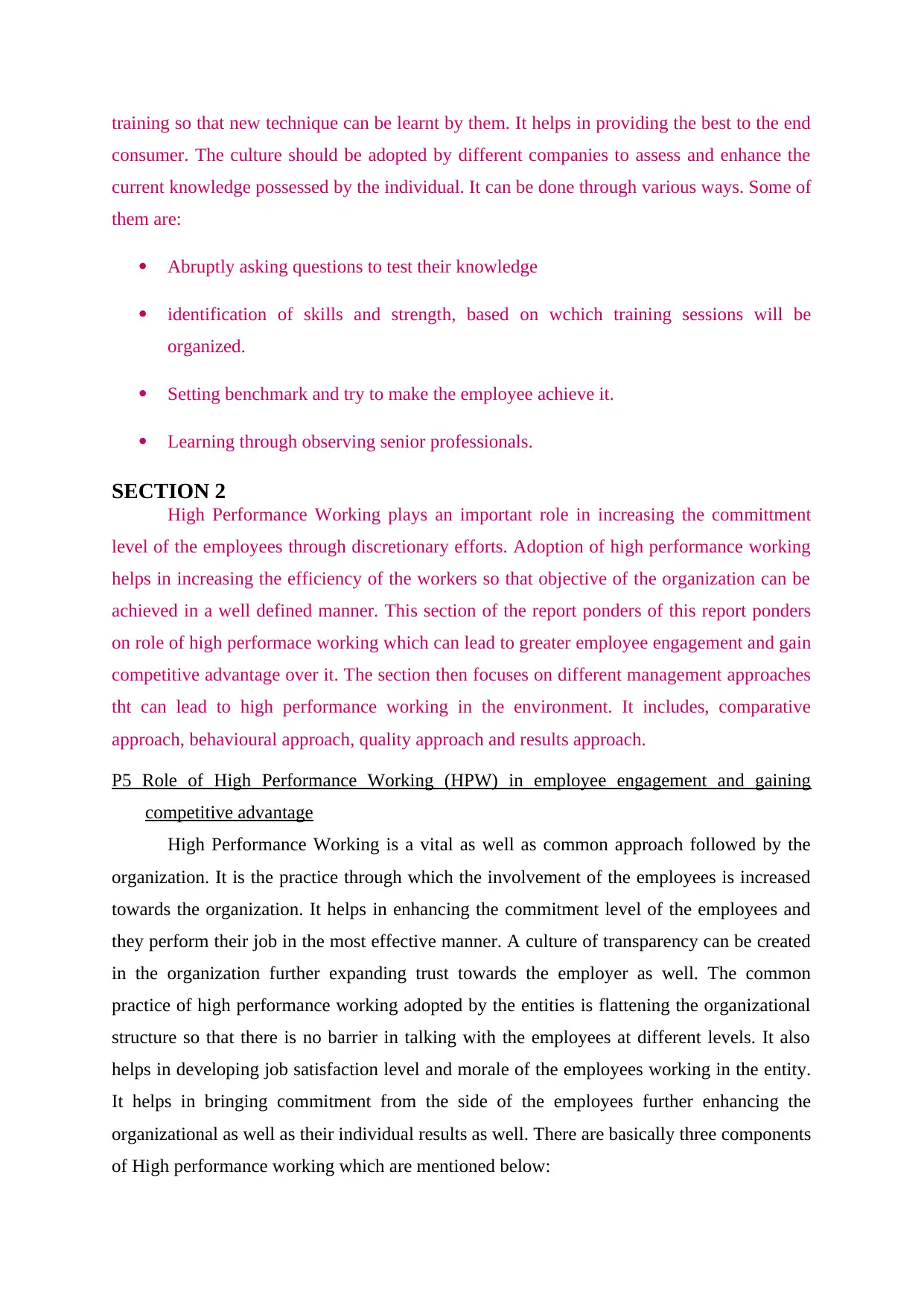
training so that new technique can be learnt by them. It helps in providing the best to the end
consumer. The culture should be adopted by different companies to assess and enhance the
current knowledge possessed by the individual. It can be done through various ways. Some of
them are:
Abruptly asking questions to test their knowledge
identification of skills and strength, based on wchich training sessions will be
organized.
Setting benchmark and try to make the employee achieve it.
Learning through observing senior professionals.
SECTION 2
High Performance Working plays an important role in increasing the committment
level of the employees through discretionary efforts. Adoption of high performance working
helps in increasing the efficiency of the workers so that objective of the organization can be
achieved in a well defined manner. This section of the report ponders of this report ponders
on role of high performace working which can lead to greater employee engagement and gain
competitive advantage over it. The section then focuses on different management approaches
tht can lead to high performance working in the environment. It includes, comparative
approach, behavioural approach, quality approach and results approach.
P5 Role of High Performance Working (HPW) in employee engagement and gaining
competitive advantage
High Performance Working is a vital as well as common approach followed by the
organization. It is the practice through which the involvement of the employees is increased
towards the organization. It helps in enhancing the commitment level of the employees and
they perform their job in the most effective manner. A culture of transparency can be created
in the organization further expanding trust towards the employer as well. The common
practice of high performance working adopted by the entities is flattening the organizational
structure so that there is no barrier in talking with the employees at different levels. It also
helps in developing job satisfaction level and morale of the employees working in the entity.
It helps in bringing commitment from the side of the employees further enhancing the
organizational as well as their individual results as well. There are basically three components
of High performance working which are mentioned below:
consumer. The culture should be adopted by different companies to assess and enhance the
current knowledge possessed by the individual. It can be done through various ways. Some of
them are:
Abruptly asking questions to test their knowledge
identification of skills and strength, based on wchich training sessions will be
organized.
Setting benchmark and try to make the employee achieve it.
Learning through observing senior professionals.
SECTION 2
High Performance Working plays an important role in increasing the committment
level of the employees through discretionary efforts. Adoption of high performance working
helps in increasing the efficiency of the workers so that objective of the organization can be
achieved in a well defined manner. This section of the report ponders of this report ponders
on role of high performace working which can lead to greater employee engagement and gain
competitive advantage over it. The section then focuses on different management approaches
tht can lead to high performance working in the environment. It includes, comparative
approach, behavioural approach, quality approach and results approach.
P5 Role of High Performance Working (HPW) in employee engagement and gaining
competitive advantage
High Performance Working is a vital as well as common approach followed by the
organization. It is the practice through which the involvement of the employees is increased
towards the organization. It helps in enhancing the commitment level of the employees and
they perform their job in the most effective manner. A culture of transparency can be created
in the organization further expanding trust towards the employer as well. The common
practice of high performance working adopted by the entities is flattening the organizational
structure so that there is no barrier in talking with the employees at different levels. It also
helps in developing job satisfaction level and morale of the employees working in the entity.
It helps in bringing commitment from the side of the employees further enhancing the
organizational as well as their individual results as well. There are basically three components
of High performance working which are mentioned below:
⊘ This is a preview!⊘
Do you want full access?
Subscribe today to unlock all pages.

Trusted by 1+ million students worldwide
1 out of 17
Related Documents
Your All-in-One AI-Powered Toolkit for Academic Success.
+13062052269
info@desklib.com
Available 24*7 on WhatsApp / Email
![[object Object]](/_next/static/media/star-bottom.7253800d.svg)
Unlock your academic potential
Copyright © 2020–2026 A2Z Services. All Rights Reserved. Developed and managed by ZUCOL.





